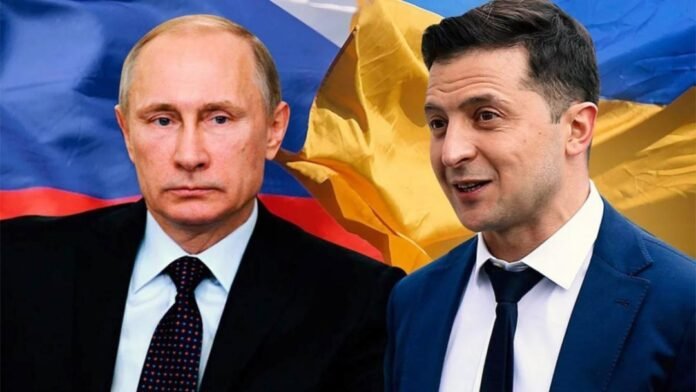Post the Alaska summit between the US and the Russian Presidents, it became evident that Ukrainian President Volodymyr Zelenskyy and European leaders have been left with no choice but to follow Trump’s style to find a solution to the more than three-year-old Russia-Ukraine war.
Trump wants a peace agreement between Ukraine and Russia, even as European leaders, who landed at the White House in support of Ukraine, tried to present a saner view before the US President over the importance of a ceasefire before rushing into peace talks with Russia.
Yet, the US President, driven by his zeal to secure a Nobel Peace Prize, appears determined to fast-track negotiations, even at the risk of overlooking the ground realities.
Firstly, Russian President Putin has not confirmed any meeting with Zelenskyy so far; secondly, there is no guarantee whether any breakthrough on the peace front could be achieved even if a meeting takes place between Russian and Ukrainian leaders; thirdly, President Trump has ruled out sending troops to Ukraine to enforce potential peace deal with Russia; lastly, Moscow is firmly opposed to the presence of any NATO troops in Ukraine, regardless of the insignia or mandate under which they would operate.
Against this background, how Trump’s push for peace between Russia and Ukraine would be worked out remains a deeply uncertain question.
Trump wants a peace agreement between Ukraine and Russia, even as European leaders, who landed at the White House in support of Ukraine, tried to present a saner view before the US President over the importance of a ceasefire before rushing into peace talks with Russia. Yet, the US President, driven by his zeal to secure a Nobel Peace Prize, appears determined to fast-track negotiations, even at the risk of overlooking the ground realities
Trump’s peace gamble
Last week, Russian President Vladimir Putin did not blink and nor did he allow US President Donald Trump to throw a tantrum on the Ukraine War, an issue which was at the centre of their two-hour-and 45-minutes meeting in Alaska.
Rather, President Trump who had, prior to the high-voltage meeting, threatened that he would impose new sanctions on Russia and its partners if no ceasefire on the Ukraine War would materialise, was seen gleefully telling the international media that “great progress” was made during the meeting even though no breakthrough could be achieved.
In simple words, Vladimir Putin won Trump over in a mind game, giving the latter nothing concrete on the Ukraine conflict, except for making him sing paeans to Russia, as incredibly rich in natural resources and stretching across 11 time zones.
Then Putin’s remarks, that no war with Ukraine would have happened had Trump been the US President in 2022, played neatly into the latter’s own political narrative, reinforcing the perception of alignment without altering the ground realities of the conflict.
Moreover, it has been now left to Ukraine and the European countries to wriggle out a way to end more than three-years long war, while at the same time, restraining Trump from turning his threats of hitting Moscow and its partners with steep secondary sanctions into reality if Russia fails to agree to end the war on Ukraine.
Vladimir Putin won Trump over in a mind game, giving the latter nothing concrete on the Ukraine conflict, except for making him sing paeans to Russia, as incredibly rich in natural resources and stretching across 11 time zones. Then Putin’s remarks, that no war with Ukraine would have happened had Trump been the US President in 2022, played neatly into the latter’s own political narrative, reinforcing the perception of alignment without altering the ground realities of the conflict
Experts call it a paradoxical situation: President Trump, who once claimed that he could end the Russia-Ukraine War in just two minutes, has now to wait and see what approaches the European leaders and Ukrainian President Volodymyr Zelenskyy take towards resolving the conflict.
That is, however, appearing as a far-fetched affair. At most, the Alaska meet will be remembered for its ‘photo-ops’ between the leaders of the world’s two powerful countries, who sat together to decide the fate of millions of beleaguered Ukrainians without their representatives being on the table.
Will Russia agree to a peace deal with Ukraine?
As there is no strong enough hint to suggest that Russia would move back its troops from the battlefield and give the peace a chance, without getting assurances on the fulfilment of its demands, which include accepting Crimea as a Russian territory, handing over Donetsk, an industrial region and Luhansk to Moscow.
Russia presently controls a fifth of Ukraine, including about three-quarters of Donetsk province, which it first entered in 2014. Recognised for its coal, steel, and energy resources, Donetsk is the backbone of Ukraine’s economy. Moscow also wants that Ukraine should desist from becoming a NATO member. The Russian President, as per reports, told President Trump during the meeting in Alaska that he could freeze the rest of the frontline if his core demands were met.
In the southern regions of Ukraine, such as Kherson and Zaporizhzhia, Russian troops have occupied huge tracts of land. President Putin, as per some media reports, told President Trump that he would give back these territories to Ukraine if his core demands were met.
Experts call it a paradoxical situation: President Trump, who once claimed that he could end the Russia-Ukraine War in just two minutes, has now to wait and see what approaches the European leaders and Ukrainian President Volodymyr Zelenskyy take towards resolving the conflict
Haze continues over peace deal
After his meeting with Putin, Trump said he wants to have a permanent peace agreement, instead of a ceasefire between Ukraine and Russia. He reiterated this claim before Zelenskyy and European leaders during their meeting at the White House on August 18.
In that meeting, Trump reportedly told Zelenskyy that he would have to hold bilateral talks with Vladimir Putin. The US President also held telephonic talks with the Russian leader and stressed on arranging a meeting with the Ukrainian President.
This telephonic conversation between Trump and Putin took place soon after the US President hosted Zelenskyy and European leaders at the White House for discussion on the roadmap to ending conflict between Moscow and Kiev.
But the Kremlin has not confirmed whether there will be a meeting between Putin and Zelenskyy. Nor has Russia stopped attacks on Ukraine. It has led to developing an uncertain situation in Europe. In the meantime, stuck between the US President’s cold-blooded statement that Kiev would not be allowed to join NATO and nor would American troops be able to set their feet in Ukraine, the European leaders are scrambling for options related to the regional security.
Among other options, one being floated is that European troops will be sent to Ukraine but they will be under command and control of the US. These troops will operate under their own national flags.
India, which is closely watching the developments in Ukraine, has welcomed the Trump-Putin summit in Alaska. While maintaining that it appreciates the progress made at the summit, India has reiterated that the way forward “can only be through dialogue and diplomacy.” It has also stated categorically that “the world wants to see an early end to the conflict in Ukraine.”
However, there is a problem. Russia’s Foreign Ministry has ruled out the deployment of troops from NATO countries to help secure a peace deal. It has categorically maintained that it will not allow troops deployment from NATO regardless of the insignia or mandate under which they operate. In that situation, whether Trump-led initiative for peace between Russia and Ukraine will fructify, remains to be seen.
India’s reaction
India, which is closely watching the developments in Ukraine, has welcomed the Trump-Putin summit in Alaska. While maintaining that it appreciates the progress made at the summit, India has reiterated that the way forward “can only be through dialogue and diplomacy.”
It has also stated categorically that “the world wants to see an early end to the conflict in Ukraine.” During talks with Russian President Putin on August 18, when the latter made a telephonic call to the Indian Prime Minister to brief him about his meeting with the US President in Alaska, Modi is said to have maintained the same stand.
“India has consistently called for a peaceful resolution of the Ukraine conflict and supports all efforts in this regard,” PM Modi said during his conversation with Vladimir Putin. Four days before the Alaska summit, Prime Minister Modi had, during telephone conversation with Zelenskyy, reaffirmed India’s steadfast and consistent position for a peaceful settlement of the conflict.
India’s consistent call for dialogue and diplomacy, reflects the global yearning for peace, but the realities on the ground show that neither military facts nor political compulsions are aligned in favour of a quick breakthrough. The Alaska summit may be remembered less as a turning point in the war and more as a high-profile exercise in optics that left the central question unresolved: Will Russia and Ukraine ever find common ground for a just and lasting peace?
According to the Ministry of External Affairs, India is committed to extending all possible support towards efforts aimed at the earliest restoration of peace in Ukraine. Prime Minister Modi was in Ukraine in August 2024—first ever by an Indian Prime Minister since it got independence in 1991, and which was a significant diplomatic milestone.
Yet, despite India’s clear-cut support to Kiev for peace, the West tended to interpret the move through the prism of their own strategic calculations.
Overall, Trump’s eagerness to fast-track an agreement, driven as much by personal ambition as by geopolitical considerations, clashes with Russia’s uncompromising demands and Europe’s deep security anxieties. Ukraine and its European partners are left grappling with difficult choices under mounting pressure.
India’s consistent call for dialogue and diplomacy, reflects the global yearning for peace, but the realities on the ground show that neither military facts nor political compulsions are aligned in favour of a quick breakthrough. The Alaska summit may be remembered less as a turning point in the war and more as a high-profile exercise in optics that left the central question unresolved: Will Russia and Ukraine ever find a common ground for a just and lasting peace?
–The writer is a senior journalist with wide experience in covering international affairs. The views expressed are of the writer and do not necessarily reflect the views of Raksha Anirveda






